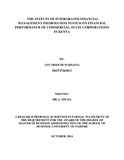| dc.description.abstract | The last decade has seen a revolutionary shift towards Integrated Public Financial Management
in Kenya due to the dynamic nature of local and global macroeconomic forces. The potential to
create, process and use information instantaneously, without barriers of geography or physical
constraints is enormous and continues to grow exponentially underscoring the need for
Integrated Financial Management. A descriptive survey was used to answer the research
questions on the current status of the subject of the study and in reference to the objectives of the
study. The target population of the study was all the Commercial state corporations in Kenya
totalling fifty three (53). A census survey of all the 53 commercial state corporations was
undertaken in which case questionnaires were used to collect primary data from the respondents.
The data was quantitatively and qualitatively analyzed and presented as frequency and
percentage tables. The study found out that state corporations have adopted various IFMIS
practices to enhance their financial performance. The regression analysis conducted revealed that
the respective IFMIS practices adopted by commercial state corporations have had a significant
impact on their financial performance as indicated by the high Coefficient of Multiple
Determination of (R2 Square) 0.843 and P-Value of 0.001. This implies that, 84.3% of the
financial performance of commercial state corporations can be attributed to the Integrated
Financial Management practices they have adopted. The study recommends that; owing to the
fact that 31.6% commercial state corporations are yet to adopt IFMIS, the National government
through line ministries should put an effort to bring the remnant state corporations to the fold
given the fact that public expenditure through state corporations accounts for over 45% of the
GDP of the country. The study reiterates the need for the relevant government organs to address
the various challenges outlined in the study in order to make the goals of the IFMIS e- project
feasible. According to the research there is need for more investments into research in critical
success factors for successful adoption and implementation of Integrated Financial Management
among state corporations in Kenya. The study was limited by cost and time. | en_US |

